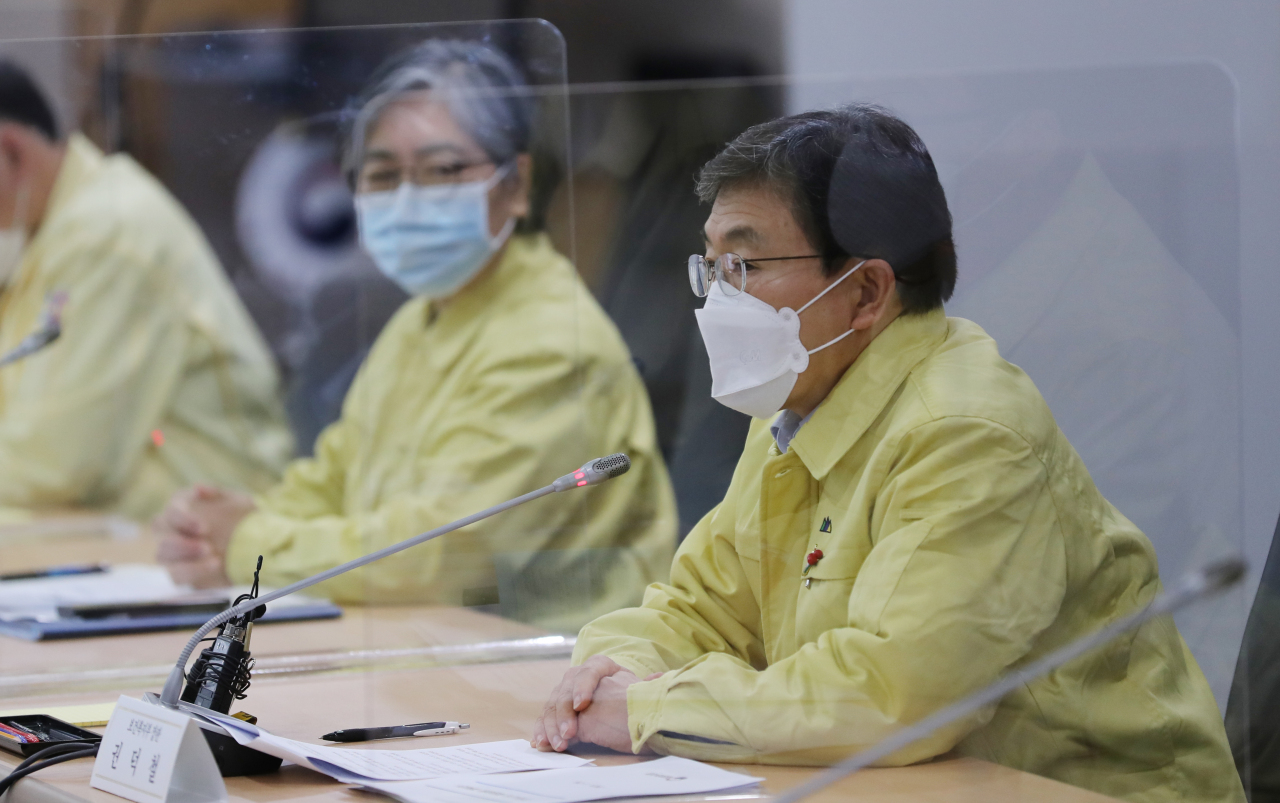With COVID-19 vaccines just weeks away, S. Korea aims high
Government says 70 percent of population will be vaccinated by September
By Kim ArinPublished : Jan. 26, 2021 - 17:38

With the first COVID-19 vaccines to arrive here in just a few weeks, South Korea is drawing up a national plan to achieve the coveted goal of herd immunity with hopes of exiting the pandemic before the year is over.
The government announced in a virtual news conference after a presidential briefing on Monday that it plans to vaccinate 70 percent of the Korean population by the end of September. Herd immunity will be reached by November. This is an expedited time frame compared with the one proposed earlier by the Korea Disease Control and Prevention Agency.
But some experts worry that given the tight schedule, the level of planning and coordination necessary to meet the targets is still far from adequate.
Preventive medicine specialist Dr. Choi Jae-wook, who leads the Korean Medical Association’s scientific review committee, said vaccinating 70 percent of Korea’s 52 million people by fall will be a “very demanding task that requires intricate planning,” he said.
“If you do the math it’s quite an ambitious timeline. Tens of thousands of people will have to be vaccinated a day,” he said.
“People have to give written consent for vaccination, and stay rested for about 20 minutes before leaving the clinic to see they are not experiencing any adverse reactions. All of that process will probably take close to an hour at least to have one person safely vaccinated,” he said.
“There are also of course the logistics challenges of the mRNA vaccine that needs to be kept in ultra-cold temperatures. Our health care facilities are not equipped with the technology.”
Choi added that while the vaccine rollout is just around the corner, even the basic details were still shrouded in secrecy. He called for more transparency from the government regarding decisions on which vaccines will go to whom, in what order and when, as well as a vaccine delivery schedule.
“With the mammoth operation ahead, these things should be communicated with health care providers and experts outside the government, as they will be the ones to dole out the vaccines to the public for the next several months,” he said.
A Korean Medical Association official, internal medicine physician Dr. Kim Dae-ha, pointed out that the first meeting between the government and the medical groups on COVID-19 immunization planning was held Tuesday, just two days before a final plan is set to be announced Thursday.
The government and representatives of health care professionals met for an hour at the KDCA headquarters in Chungju, North Chungcheong Province, Tuesday morning. The heads of three associations -- of doctors, nurses and hospitals -- were each given three minutes to make their pitches.
“So far not much is known about the vaccine distribution in the country in order to actually get to preparations, and this is just the first meeting and a rather brief one at that,” he said.
He said the medical association had asked the government to inform it in advance which medical institutions would be providing the vaccines, so it could offer training and education to the staff involved, among other matters.
Top officials including KDCA Commissioner Jung Eun-kyeong, Health Minister Kwon Deok-cheol and Food and Drug Safety Vice Minister Yang Jin-young attended the Tuesday meeting.
“Korea runs a successful national immunization program covering roughly 60 to 70 percent of the population annually. I’m confident that our health care infrastructure and medical workers are up to the challenge,” the health minister was quoted as saying. The details of what was discussed at the meeting were not revealed at the time of writing.
While the full plan is still in the works, the national health protection agency said health care personnel on the front lines and older adults in long-term care facilities or other group settings will be offered the first doses of the vaccine.
Also on the priority list are adults aged 65 or above, adults with high-risk medical conditions and essential workers such as police officers and firefighters, the agency said.
According to the latest government announcement, Korea has secured enough vaccines for 56 million people and is pursuing additional deals to cover 20 million more.
The local regulatory agency hinted Monday that the AstraZeneca and Pfizer vaccines, which are currently being reviewed, will be approved for use here by the first half of next month.
“If all goes well, the vaccines will be granted approval no later than the second week of February,” Food and Drug Safety Minister Kim Gang-lip said.
Professor of preventive medicine Dr. Jung Jae-hun at Gachon University said the goal of herd immunity before winter seemed “doable” due in large part to the country’s vaccine-friendly public.
“Once vaccines become available, many here will be willing to accept it. Korea’s medical system also has years of experience with mass vaccination campaigns,” he said.
Virologist Dr. Paik Soon-young said Korea also had to brace for the possibility of vaccine deliveries being delayed, which could prevent the vaccination programs from proceeding as scheduled.
“Other countries are already experiencing lag time between shipments of the vaccine,” he said. “Some strategic choices might be needed based on how many of which vaccines actually make it here. For instance, as most vaccines require a two-dose treatment, it could be a better move to give more people a single shot each rather than giving fewer people two full doses.”
By Kim Arin (arin@heraldcorp.com)



















![[Today’s K-pop] BTS pop-up event to come to Seoul](http://res.heraldm.com/phpwas/restmb_idxmake.php?idx=642&simg=/content/image/2024/04/17/20240417050734_0.jpg&u=)